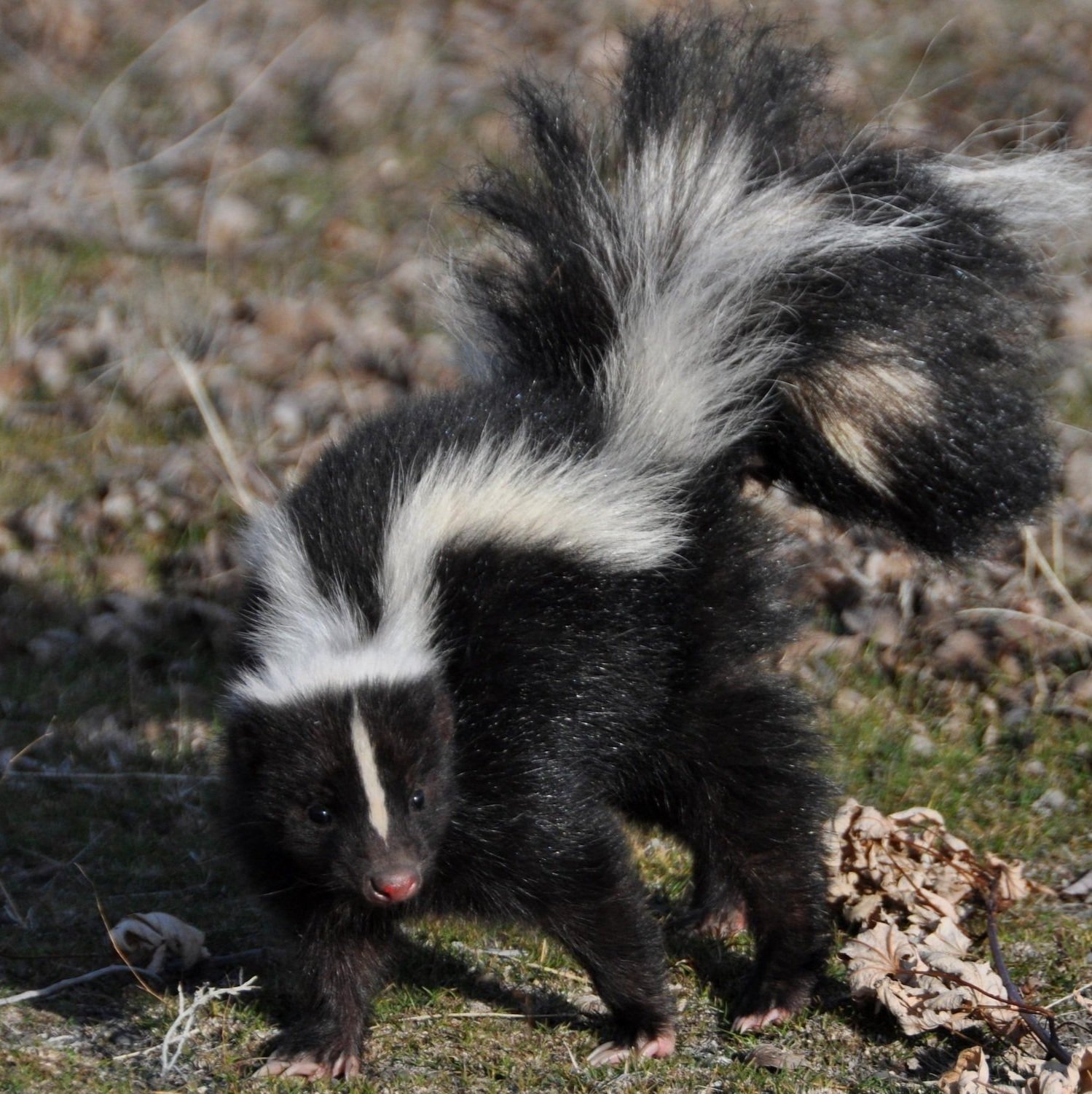
Help! I Found a Skunk!
Skunks are a Rabies Vector Species (RVS). Any mammal (including humans) can get rabies, but cases are most commonly reported from Rabies Vector Species like foxes, raccoons, skunks, groundhogs and bats, as well as stray cats and dogs. You should avoid handling an RVS, but if it is absolutely necessary, always handle it with caution by wearing thick gloves. An RVS cannot be relocated in Pennsylvania if trapping. Please understand that an RVS does NOT mean it is automatically carrying rabies.
Remember: It is illegal to keep and raise wildlife
Myth: A skunk has rabies if it’s roaming during the day instead of at night
If You Find a Skunk That:
Is not fully furred, and its eyes are sealed shut
Appears sick or injured
Is lethargic, disoriented or has difficulty moving/balancing
Is approaching humans
Has been in a dog or cat’s mouth
Was hit by a car
Has parasites, including fly eggs (look like little grains of rice)
This is an emergency. Receive immediate support here or contact your local wildlife rehabilitator.
If You Find a Skunk That:
Looks like a miniature adult and can evade humans
Had its den excavated, and the den location is known
This is normal! For more solutions to common problems with skunks in human spaces, visit this page.
How To Save Baby and Juvenile Skunks
Young skunks, or kits, can spray from birth but not accurately until four months old. Skunks (adults and young) will typically utilize their spray only for defense when startled and/or faced with a threat.
Skunk kits are born nearly furless and with their eyes closed. However, they still display faint black and white striped markings. Kits will remain in their underground dens with their mother until their eyes and ears open between six and seven weeks old. Skunks younger than six and seven weeks are rarely found outside of their dens unless they’ve been orphaned or the den has been accidentally excavated.
Skunk kits will begin to emerge from their den around eight weeks old but will not wander far from their home or mother. If threatened at this age, they may defend themselves by stomping their feet, lifting their tails and spraying. At eight weeks, skunk kits regularly follow their mother outside of the den to forage for short periods.
Mother skunks typically have one litter of kits per year from May to June.
How To Renest Skunk Kits
If you find a skunk kit clumsily walking around but with no mother or adult skunk nearby, renesting may be necessary. Kits are rarely found outside the den unless they are of age, which is about eight weeks, and their eyes and ears are open.
Wear thick gardening gloves. Skunks are a Rabies Vector Species and can bite even at a young age.
Check the kits carefully for injuries. Purple or red spots under the skin are a common sign of bruising. If the kits appear injured, contact a wildlife rehabilitator immediately.
Do not give the kits any food, water or formula — we want them to be hungry and call for mom!
Whisper or speak softly at all times if you absolutely must approach a skunk. Because skunks have poor vision, speaking softly allows them to know your location. If the skunk begins stomping its feet and flashing its tail, pause and wait for them to calm down before moving again. Skunks will typically only spray humans if they’re being chased or followed to their den.
Gather the kits and place them in a box that they cannot crawl out of. Make sure the box is also accessible for the adult skunk to reach over the edge and collect the kits (a shoebox is typically okay).
Keep the kits warm. This is a priority! Fill a bottle with hot water and wrap it in a towel. Place the wrapped water bottle securely in the box next to the kits. You may need to reheat the water bottle throughout the reunion process. You can also use heating pads, rice-filled socks or hand warmers. Note: If the kits can be returned directly to the original nest, no heat source is required.
Place the kits in a safe location as close as possible to where they were found.
Leave the area and watch from a distance. Mom will not come back if she senses danger (humans, pets, etc.).
Allow time from when they were found. Skunks are nocturnal and are mostly active overnight. Allow time from when the kits were found until the following morning so mom can retrieve the kits overnight.
Contact a wildlife rehabilitator if the mom does not retrieve her kits by the next morning. Keep the kits warm and secure, but do not offer them any food, water, or formula.
How To Save Adult Skunks
At 10 weeks old, skunk kits are independent and no longer need care from their mother. They may remain with their family group until late summer but are able to survive alone. Skunks may occasionally forage or be active during daylight hours, despite being a nocturnal species. Daytime activity is not an indicator of rabies!
Skunks have poor vision and can often end up trapped in window wells or other spaces. We provide solutions to common trapped skunk situations on this page.
If an adult skunk is unresponsive to humans (both through visuals and sound), lethargic or has difficulty moving/balancing, contact a rehabilitator immediately.
What To Do When Sprayed By a Skunk
If you absolutely must approach a skunk, whisper at all times; skunks have poor vision, so speaking softly allows them to know your location. If the skunk begins stomping its feet and flashing its tail, pause and wait for them to calm down before moving again. Skunks will typically only spray humans if they’re being chased or followed to their den.
Wondering what to do if you or your dog has been sprayed by a skunk? Use a mixture to wash your dog or your clothes. If the spray is in anyone’s eyes, flush them out with water and consult a doctor or veterinarian if irritation persists.
1 quart 3% hydrogen peroxide*
¼ cup baking soda
1 teaspoon liquid soap (laundry or dish washing)
*The hydrogen peroxide in this mixture may lighten or “highlight” the fur of a dog with a dark coat.
Do you still have questions after reading the information above? Contact us or a local wildlife rehabilitator!
Have you found this FREE information helpful? Help support our work and expand our services by giving a gift.
Resources
Answering the Call of the Wild by Erin Luther. Toronto Wildlife Centre.

